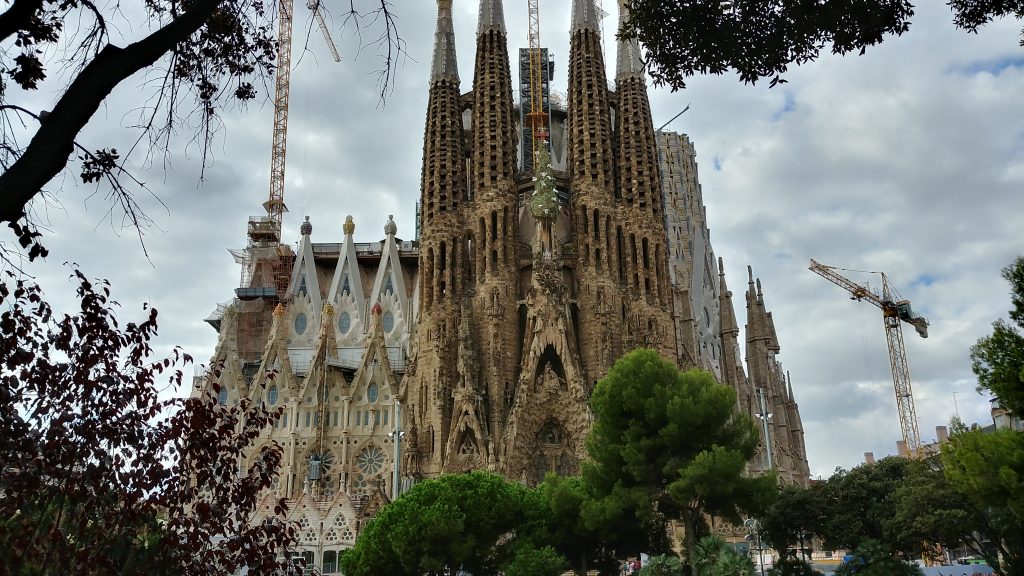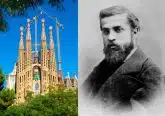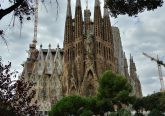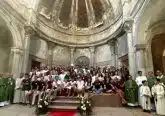Pope Francis: Sagrada Familia’s new star shines for Barcelona’s poor, ill, elderly, and young people
Barcelona, Spain, Dec 8, 2021 / 12:00 pm
Pope Francis said that a star lit up for the first time on Wednesday atop Sagrada Família Basilica shines for the poor, ill, elderly, and young people of Barcelona.
The 12-pointed star at the peak of the basilica’s soaring Tower of the Virgin Mary was lit up at 7:50 p.m. local time on Dec. 8.
In a video message, Pope Francis said: “Peace and all good! And with this cordial Franciscan greeting, I join you all from Rome at this moment when the star on the Tower of the Virgin Mary in the Sagrada Família Basilica is being lit.”
“I would also like to extend my greetings in a special way to the poorest people of this great city, to the sick, to those affected by the COVID-19 pandemic, to the elderly, to the young people whose future is being jeopardized by various situations, to those who are experiencing moments of trial. Dear friends, today the star of the Tower of Mary shines for all of you.”
The star’s illumination transforms the skyline of Barcelona, the capital of the autonomous community of Catalonia, in northeastern Spain, with a population of 1.6 million people.
The glass and steel star is around 20 feet in diameter. The star will shine by day in the sunlight and be illuminated from within at night. Its structure has been tested to resist lightning and shocks up to 100 kilograms (around 220 pounds).
The unfinished basilica, dedicated to the Holy Family, is expected to be completed in 2026, the centenary of the visionary Catalan architect Antoni Gaudí’s death.
In his video message, the pope referred to the portals of faith, hope, and charity on the Nativity facade of the Sagrada Família, one of the earliest parts of the basilica to be finished.
He said: “Today we celebrate the Solemnity of Mary Immaculate. She is indeed a masterpiece! In perfect harmony with God’s plan for her, the Virgin Mary became the most holy, humble, docile, and transparent before God.”
“Gaudí wanted this mystery to crown the portal of faith — the first one he built — so that, as we unfold the prayer to the Holy Trinity, which he rewrites throughout the basilica, we would learn to be, like Mary, a temple of this mystery, and to worship God in spirit and in truth.”
“The Gospel of Luke refers to her as ‘full of grace’ (Luke 1:28). We too address her in this way in every Hail Mary we pray, always feeling her maternal and dear presence. She is filled with the presence of God, who has become flesh in her womb.”
“This is why Gaudí also places her at the center of the portal of charity, offering us the Divine Child under the watchful eye of St. Joseph, so that we may enter his church inflamed with love for God and for mankind.”
He went on: “I encourage you too to follow the example of the Virgin Mary with daily gestures of love and service. The immaculate beauty of our Mother is inimitable. And, at the same time, it attracts us.”
“May this star that shines from today enlighten you so that, as you unravel the beads of the rosary, you may say ‘yes’ once and for all to the grace of the Lord and give a resounding ‘no’ to sin.”
The Sagrada Família was consecrated and proclaimed a minor basilica by Benedict XVI on Nov. 7, 2010.
The church was forced to close to tourists from March to July 2020 due to the coronavirus crisis.
Xavier Martinez, the basilica’s general director, said that this October the church received only 40% of the number of visitors in October 2019, before the outbreak of the pandemic.
The Tower of the Virgin Mary stands next to the central Tower of Jesus Christ, which is surrounded by four smaller Towers of the Evangelists.
At 450 feet, the Marian tower will be the basilica’s second-highest after the Tower of Jesus Christ, which will rise to around 570 feet. The Tower of Mary is the first of the six central towers to be completed.
Twelve wrought-iron stars that surround the tower’s crown were set in place on Nov. 9.
The lighting of the 800 windows that form the tower and the star took place in three stages. On Dec. 4, the lower part was lit up, followed by the upper part on Dec. 6, and finally the whole tower and star on Dec. 8.
The full illumination was preceded by a live-streamed Mass celebrated by Cardinal Juan José Omella of Barcelona. The pope’s video message was played inside the church. The cardinal then exited the basilica, where he greeted a crowd gathered to witness the illumination and gave a blessing.
The inauguration featured the premiere of a forceful new work, “Magnificat,” by composer Marc Timón, performed by Orfeó Català. The music resounded as the star was lit up for the first time.
Antoni Gaudí, a devout and ascetic figure, began working on the project in 1883. In 1914 he stopped all other works to focus exclusively on the basilica, to which he dedicated himself until his unexpected death.
He was struck by a tram in 1926, at the age of 73, while walking to Barcelona’s St. Philip Neri church for confession. Passersby did not recognize the famed architect because of his worn-out clothes and lack of identity papers.
He died three days after the accident and was buried in the crypt of his unfinished basilica. His cause for canonization was opened in Rome in 2003.
The basilica finally received an official building permit in 2019, 137 years after its construction began.
Progress was initially slow as the works depended on private donations. Building work was interrupted by the Spanish Civil War, during which combatants set fire to the crypt and destroyed some of the architect’s designs and plaster models.
Gaudí created numerous celebrated works in Barcelona using his distinctive style inspired by natural forms and eschewing the sharp angles associated with modernist architecture.
He summed up his approach by saying, “The straight line belongs to men, the curved one to God.”
When questioned about how long it would take to build the basilica, he reputedly said, “My client is not in a hurry” — referring to God.













